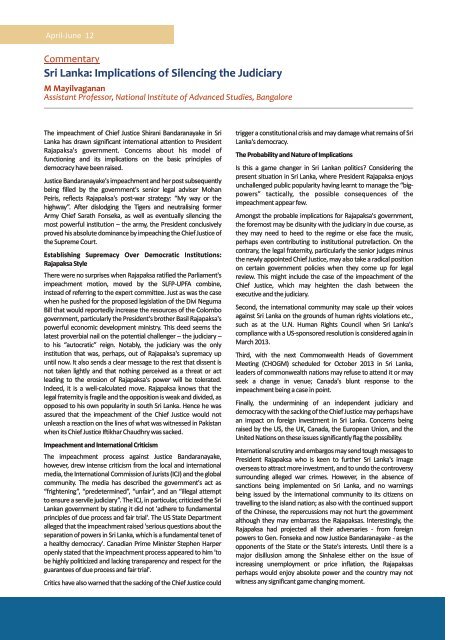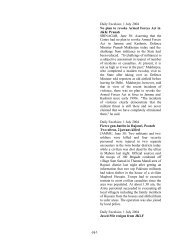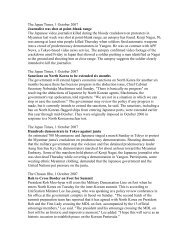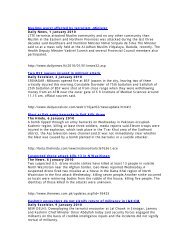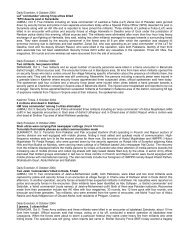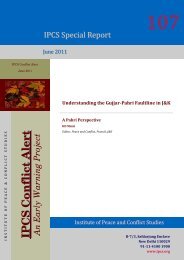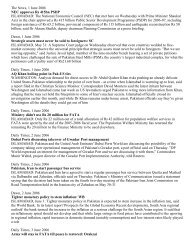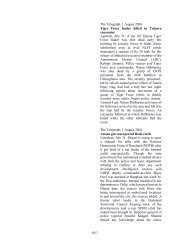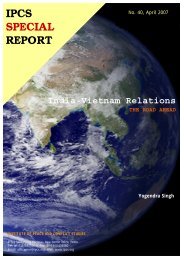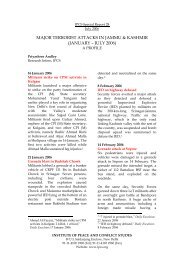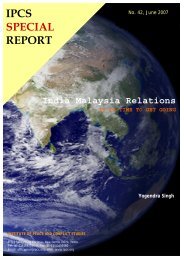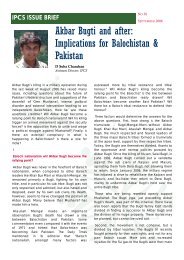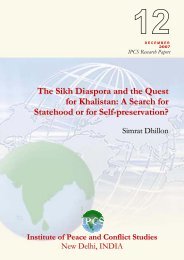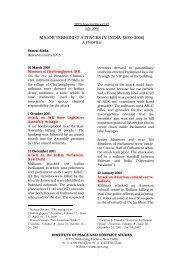April-June 2013 - Institute of Peace and Conflict Studies
April-June 2013 - Institute of Peace and Conflict Studies
April-June 2013 - Institute of Peace and Conflict Studies
Create successful ePaper yourself
Turn your PDF publications into a flip-book with our unique Google optimized e-Paper software.
<strong>April</strong>-<strong>June</strong> 12<br />
Commentary<br />
Sri Lanka: Implications <strong>of</strong> Silencing the Judiciary<br />
M Mayilvaganan<br />
Assistant Pr<strong>of</strong>essor, National <strong>Institute</strong> <strong>of</strong> Advanced <strong>Studies</strong>, Bangalore<br />
The impeachment <strong>of</strong> Chief Justice Shirani B<strong>and</strong>aranayake in Sri<br />
Lanka has drawn significant international attention to President<br />
Rajapaksa's government. Concerns about his model <strong>of</strong><br />
functioning <strong>and</strong> its implications on the basic principles <strong>of</strong><br />
democracy have been raised.<br />
Justice B<strong>and</strong>aranayake's impeachment <strong>and</strong> her post subsequently<br />
being filled by the government's senior legal adviser Mohan<br />
Peiris, reflects Rajapaksa's post-war strategy: “My way or the<br />
highway”. After dislodging the Tigers <strong>and</strong> neutralising former<br />
Army Chief Sarath Fonseka, as well as eventually silencing the<br />
most powerful institution – the army, the President conclusively<br />
proved his absolute dominance by impeaching the Chief Justice <strong>of</strong><br />
the Supreme Court.<br />
Establishing Supremacy Over Democratic Institutions:<br />
Rajapaksa Style<br />
There were no surprises when Rajapaksa ratified the Parliament's<br />
impeachment motion, moved by the SLFP-UPFA combine,<br />
instead <strong>of</strong> referring to the expert committee. Just as was the case<br />
when he pushed for the proposed legislation <strong>of</strong> the Divi Neguma<br />
Bill that would reportedly increase the resources <strong>of</strong> the Colombo<br />
government, particularly the President's brother Basil Rajapaksa's<br />
powerful economic development ministry. This deed seems the<br />
latest proverbial nail on the potential challenger – the judiciary –<br />
to his “autocratic” reign. Notably, the judiciary was the only<br />
institution that was, perhaps, out <strong>of</strong> Rajapaksa's supremacy up<br />
until now. It also sends a clear message to the rest that dissent is<br />
not taken lightly <strong>and</strong> that nothing perceived as a threat or act<br />
leading to the erosion <strong>of</strong> Rajapaksa's power will be tolerated.<br />
Indeed, it is a well-calculated move. Rajapaksa knows that the<br />
legal fraternity is fragile <strong>and</strong> the opposition is weak <strong>and</strong> divided, as<br />
opposed to his own popularity in south Sri Lanka. Hence he was<br />
assured that the impeachment <strong>of</strong> the Chief Justice would not<br />
unleash a reaction on the lines <strong>of</strong> what was witnessed in Pakistan<br />
when its Chief Justice Iftikhar Chaudhry was sacked.<br />
Impeachment <strong>and</strong> International Criticism<br />
The impeachment process against Justice B<strong>and</strong>aranayake,<br />
however, drew intense criticism from the local <strong>and</strong> international<br />
media, the International Commission <strong>of</strong> Jurists (ICJ) <strong>and</strong> the global<br />
community. The media has described the government's act as<br />
“frightening”, “predetermined”, “unfair”, <strong>and</strong> an “illegal attempt<br />
to ensure a servile judiciary”. The ICJ, in particular, criticized the Sri<br />
Lankan government by stating it did not 'adhere to fundamental<br />
principles <strong>of</strong> due process <strong>and</strong> fair trial'. The US State Department<br />
alleged that the impeachment raised 'serious questions about the<br />
separation <strong>of</strong> powers in Sri Lanka, which is a fundamental tenet <strong>of</strong><br />
a healthy democracy'. Canadian Prime Minister Stephen Harper<br />
openly stated that the impeachment process appeared to him 'to<br />
be highly politicized <strong>and</strong> lacking transparency <strong>and</strong> respect for the<br />
guarantees <strong>of</strong> due process <strong>and</strong> fair trial'.<br />
Critics have also warned that the sacking <strong>of</strong> the Chief Justice could<br />
trigger a constitutional crisis <strong>and</strong> may damage what remains <strong>of</strong> Sri<br />
Lanka's democracy.<br />
The Probability <strong>and</strong> Nature <strong>of</strong> Implications<br />
Is this a game changer in Sri Lankan politics? Considering the<br />
present situation in Sri Lanka, where President Rajapaksa enjoys<br />
unchallenged public popularity having learnt to manage the “bigpowers”<br />
tactically, the possible consequences <strong>of</strong> the<br />
impeachment appear few.<br />
Amongst the probable implications for Rajapaksa's government,<br />
the foremost may be disunity with the judiciary in due course, as<br />
they may need to heed to the regime or else face the music,<br />
perhaps even contributing to institutional putrefaction. On the<br />
contrary, the legal fraternity, particularly the senior judges minus<br />
the newly appointed Chief Justice, may also take a radical position<br />
on certain government policies when they come up for legal<br />
review. This might include the case <strong>of</strong> the impeachment <strong>of</strong> the<br />
Chief Justice, which may heighten the clash between the<br />
executive <strong>and</strong> the judiciary.<br />
Second, the international community may scale up their voices<br />
against Sri Lanka on the grounds <strong>of</strong> human rights violations etc.,<br />
such as at the U.N. Human Rights Council when Sri Lanka's<br />
compliance with a US-sponsored resolution is considered again in<br />
March <strong>2013</strong>.<br />
Third, with the next Commonwealth Heads <strong>of</strong> Government<br />
Meeting (CHOGM) scheduled for October <strong>2013</strong> in Sri Lanka,<br />
leaders <strong>of</strong> commonwealth nations may refuse to attend it or may<br />
seek a change in venue; Canada's blunt response to the<br />
impeachment being a case in point.<br />
Finally, the undermining <strong>of</strong> an independent judiciary <strong>and</strong><br />
democracy with the sacking <strong>of</strong> the Chief Justice may perhaps have<br />
an impact on foreign investment in Sri Lanka. Concerns being<br />
raised by the US, the UK, Canada, the European Union, <strong>and</strong> the<br />
United Nations on these issues significantly flag the possibility.<br />
International scrutiny <strong>and</strong> embargos may send tough messages to<br />
President Rajapaksa who is keen to further Sri Lanka's image<br />
overseas to attract more investment, <strong>and</strong> to undo the controversy<br />
surrounding alleged war crimes. However, in the absence <strong>of</strong><br />
sanctions being implemented on Sri Lanka, <strong>and</strong> no warnings<br />
being issued by the international community to its citizens on<br />
travelling to the isl<strong>and</strong> nation; as also with the continued support<br />
<strong>of</strong> the Chinese, the repercussions may not hurt the government<br />
although they may embarrass the Rajapaksas. Interestingly, the<br />
Rajapaksa had projected all their adversaries - from foreign<br />
powers to Gen. Fonseka <strong>and</strong> now Justice B<strong>and</strong>aranayake - as the<br />
opponents <strong>of</strong> the State or the State's interests. Until there is a<br />
major disillusion among the Sinhalese either on the issue <strong>of</strong><br />
increasing unemployment or price inflation, the Rajapaksas<br />
perhaps would enjoy absolute power <strong>and</strong> the country may not<br />
witness any significant game changing moment.


